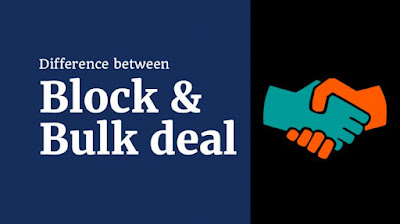Block deal and bulk deal are terms used in stock exchanges to refer to large transactions of shares that take place between two parties. Here's a brief explanation of each term:
Block deal: A block deal is a trade in which a large number of shares, typically at least 5 lakh shares or a minimum value of Rs. 5 crore, are bought or sold by a single trader or a group of traders. Block deals take place outside of the normal market hours, either in a special session or through negotiated deals between buyers and sellers. Block deals are usually executed at a price that is agreed upon between the buyer and the seller, and the transaction is reported to the stock exchange after it has been completed.
Bulk deal: A bulk deal is a trade in which a large number of shares, typically at least 0.5% of the total number of shares of a company or a minimum value of Rs. 10 crore, are bought or sold by a single trader or a group of traders in a single day through normal market hours. Unlike block deals, bulk deals take place during the normal market hours and are executed through the exchange's trading system. The transaction is reported to the stock exchange immediately after it has been completed.
Both block deals and bulk deals are used by institutional investors, such as mutual funds, hedge funds, and other large investors, to buy or sell a large number of shares of a company in a single transaction. These deals help to facilitate large transactions without causing significant fluctuations in the stock price, which can occur if the transactions were executed through normal trading channels.
SEBI's Regulations regarding Block deals and Bulk deals in India.
SEBI (Securities and Exchange Board of India) is the regulatory body that oversees the functioning of the securities market in India. SEBI has laid down certain rules and regulations regarding block deals and bulk deals in India. Here are some of the key rules:
Reporting requirement: SEBI mandates that all block deals and bulk deals should be reported to the stock exchange within 15 minutes of the trade being executed. This helps to ensure transparency in the market and prevents any manipulation of stock prices.
Price range: The price of a block deal or bulk deal cannot be more than 1% higher or lower than the prevailing market price of the stock. This helps to prevent any significant price movements due to these large transactions.
Pre-trade disclosure: The buyer and seller of the shares involved in a block deal or bulk deal must disclose their identity to each other before the trade is executed. This helps to ensure that the trades are genuine and are not being used for any illegal purposes.
Minimum quantity: The minimum quantity for a block deal is 5 lakh shares or a minimum value of Rs. 5 crore, while for a bulk deal, the minimum quantity is 0.5% of the total number of shares of a company or a minimum value of Rs. 10 crore.
Exclusion from normal trading: Block deals and bulk deals are excluded from the normal trading volume of a stock. This means that they do not affect the daily price movement of the stock and are not considered while calculating the stock's average trading volume.
Interesting data regarding block deals and bulk deals in India:
Here are some interesting data points regarding block deals and bulk deals in India:
In 2021, the total value of block deals in India was around Rs. 1.5 lakh crore, which was a significant increase compared to the previous year. This indicates that there is a growing trend of large transactions taking place outside of normal trading hours.
The banking and finance sector is the most active in terms of block deals and bulk deals in India, followed by the IT sector and the pharmaceutical sector. These three sectors accounted for more than 50% of the total value of block deals and bulk deals in 2021.
In 2021, the National Stock Exchange (NSE) was the most active exchange for block deals and bulk deals, accounting for more than 80% of the total value of such trades. The Bombay Stock Exchange (BSE) accounted for the remaining 20%.
The largest block deal in India in 2021 was the sale of 1.7 crore shares of ICICI Bank by its subsidiary, ICICI Prudential Life Insurance, to a group of investors. The transaction was worth around Rs. 1,300 crore.
In terms of bulk deals, the largest transaction in 2021 was the sale of 50 lakh shares of Avenue Supermarts, the parent company of the supermarket chain DMart, by its promoter Radhakishan Damani. The transaction was worth around Rs. 1,300 crore.


No comments:
Post a Comment